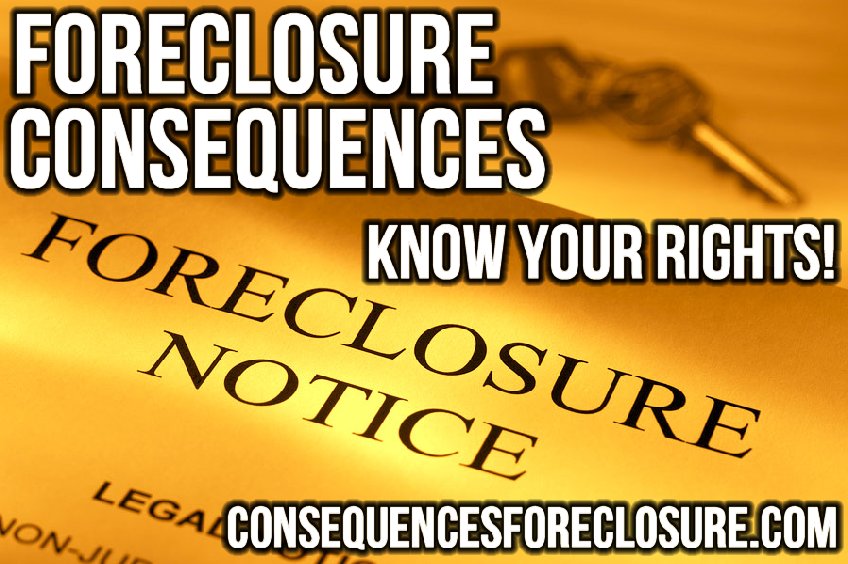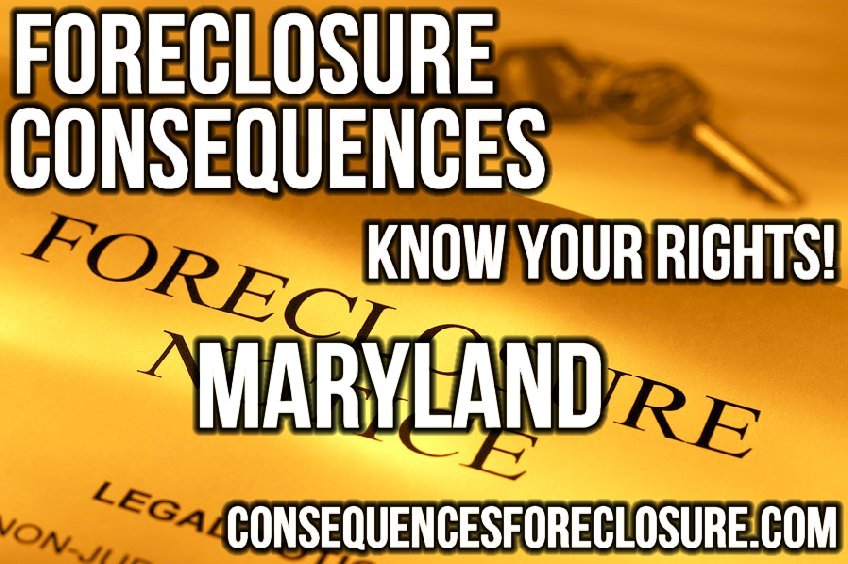 Foreclosure Consequences - Consequences of Foreclosure
Foreclosure Consequences - Consequences of Foreclosure
Foreclosure Consequences in Maryland: MD

Foreclosure Summary copyright, © ForeclosureLaw.org
Quick Facts
Judicial Foreclosure Available: Yes
Non-Judicial Foreclosure Available: Yes, with restrictions
Primary Security Instruments: Deed of Trust, Mortgage
Timeline: Typically 90 days
Right of Redemption: No
- Deficiency Judgments Allowed: Yes
In Maryland, lenders may foreclose on a mortgage or deed of trust in default using either the judicial, assent to decree, or non-judicial foreclosure process.
Judicial Foreclosure
In cases where the security instrument contains neither a power of sale nor an assent to a decree, a lender must file a complaint against the borrower and obtain a decree of sale from a court having jurisdiction in the county where the property is located before foreclosure proceedings can begin. The court will then determine whether a default has occurred.
If the court finds that a default has occurred it shall: 1) fix the amount of the debt, interest, and costs then due; and 2) provide a reasonable time within which payment may be made. The court may order that if payment is not made within the time fixed in the order, the property must be sold to satisfy the debt.
Assent To Decree Foreclosure
Assent to a decree foreclosure is used when a provision in the security document declares an assent to the entry of an order for the sale of the property upon a specified default. Lenders who use the assent to decree foreclosure must file a complaint to foreclose. However, it is not necessary for a hearing to be held prior to the foreclosure sale.
Non-Judicial Foreclosure
The non-judicial process of foreclosure is used when a power of sale clause exists in a mortgage or deed of trust. A "power of sale" clause is the clause in a deed of trust or mortgage, in which the borrower pre-authorizes the sale of property to pay off the balance on a loan in the event of the their default. In deeds of trust or mortgages where a power of sale exists, the power given to the lender to sell the property may be executed by the lender or their representative, typically referred to as the trustee.
Despite the permission given in the power of sale clause, lenders in Maryland must still file an order to docket before foreclosure proceedings can begin. However, it is not necessary for a hearing to be held prior to the foreclosure sale.
Foreclosure Guidelines
Unless otherwise stated in the original loan document or ordered by the court, the following guidelines must be adhered to in any foreclosure proceedings:
- A notice of sale must be published in a newspaper of general circulation in the county where the property resides at least once a week for three (3) successive weeks, with the first publication to be not less than fifteen (15) days prior to sale and the last publication to be not more than one week prior to sale. The notice of sale must also be sent by certified and by registered mail, not more than thirty (30) days and not less than ten (10) days before the date of the sale, to the borrower at their last known address.
- The sale must be conducted by the person authorized to make the sale (i.e. trustee, sheriff) and may take place immediately outside the courthouse entrance, on the property itself or the location advertised in the notice of sale, if different. The terms of the sale vary by process.
- If the sale is postponed, notice of the new date of sale shall be published in the manner the original notice of sale was given.
- Within thirty (30) days after the sale, the person authorized to make the sale must file a complete report of the sale with the court. The clerk of the court will then issue a notice containing a brief description to identify the property and stating that the sale will be ratified unless cause to the contrary is shown within 30 days after the date of the notice. A copy of the notice shall be published at least once a week in each of three successive weeks before the expiration of the 30-day period in one or more newspapers of general circulation in the county in which the report of sale was filed.
- Lenders have a period of three (3) years to file for a deficiency judgment, but it is limited to the balance of the loan in default after the foreclosure sale proceeds have been applied.
Learn all about foreclosure consequences in Alabama: AL, foreclosure consequences in Alaska: AK, foreclosure consequences in Arizona: AZ, foreclosure consequences in Arkansas: AR, foreclosure consequences in California: CA, foreclosure consequences in Colorado: CO, foreclosure consequences in Connecticut: CT, foreclosure consequences in Delaware: DE, foreclosure consequences in Florida: FL, foreclosure consequences in Georgia: GA, foreclosure consequences in Hawaii: HI, foreclosure consequences in Idaho: ID, foreclosure consequences in Illinois: IL, foreclosure consequences in Indiana: IN, foreclosure consequences in Iowa: IA, foreclosure consequences in Kansas: KS, foreclosure consequences in Kentucky: KY, foreclosure consequences in Louisiana: LA, foreclosure consequences in Maine: ME, foreclosure consequences in Maryland: MD, foreclosure consequences in Massachusetts: MA, foreclosure consequences in Michigan: MI, foreclosure consequences in Minnesota: MN, foreclosure consequences in Mississippi: MS, foreclosure consequences in Missouri: MO, foreclosure consequences in Montana: MT, foreclosure consequences in Nebraska: NE, foreclosure consequences in Nevada: NV, foreclosure consequences in New Hampshire: NH, foreclosure consequences in New Jersey: NJ, foreclosure consequences in New Mexico: NM, foreclosure consequences in New York: NY, foreclosure consequences in North Carolina: NC, foreclosure consequences in North Dakota: ND, foreclosure consequences in Ohio: OH, foreclosure consequences in Oklahoma: OK, foreclosure consequences in Oregon: OR, foreclosure consequences in Pennsylvania: PA, foreclosure consequences in Rhode Island: RI, foreclosure consequences in South Carolina: SC, foreclosure consequences in South Dakota: SD, foreclosure consequences in Tennessee: TN, foreclosure consequences in Texas: TX, foreclosure consequences in Utah: UT, foreclosure consequences in Vermont: VT, foreclosure consequences in Virginia: VA, foreclosure consequences in Washington: WA, foreclosure consequences in Washington, DC; foreclosure consequences in West Virginia: WV, foreclosure consequences in Wisconsin: WI, foreclosure consequences in Wyoming: WY